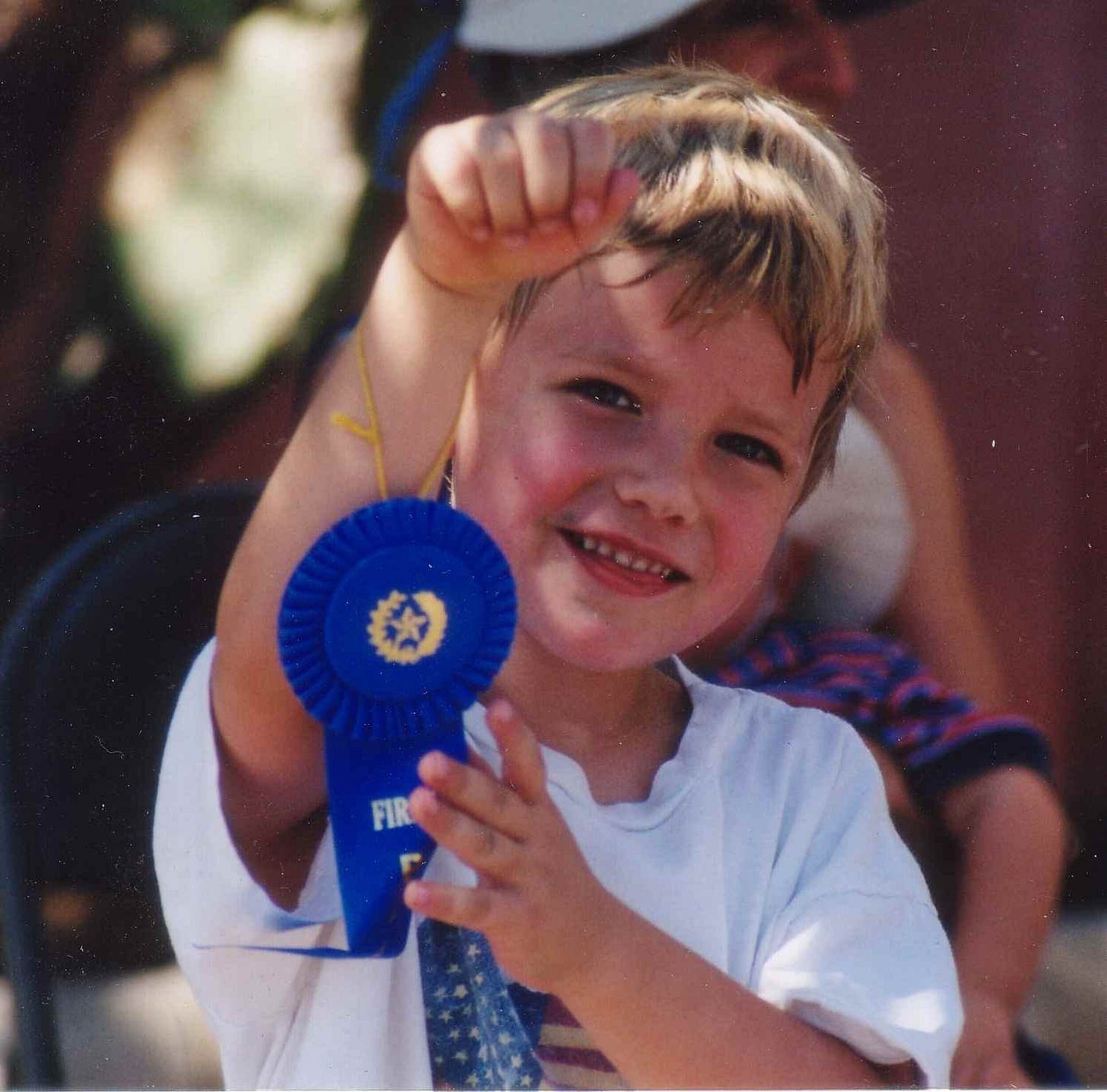American Boy, Interrupted
A memory of innocence, the slow theft of schizophrenia, and finding hope in a country that no longer listens.
He nearly collapsed from the heat that year.
Wool suit. Full mask. The whole Lincoln act, worn without complaint. The parade wound through midtown like it always did, and he walked it with this quiet, strange dignity, like he believed the part. Nobody asked him to go that far. But that was Gage. He gave everything. Always. Even to a neighborhood parade most kids treated like a lark. Even to an audience that barely looked up from their lawn chairs.
That morning, before the mask started to melt against his face, before his shirt soaked through with sweat, I watched him line up with the others—dogs in costume, kids with wagons, one neighbor dragging a cooler full of nothing but juice boxes and beer. There was real spectacle. High school marching bands. Baton twirlers. Kids in cardboard tanks and paper hats. No floats, no engines—just feet on pavement, every step earned. It had run since the early ’60s, a full neighborhood ritual with cops shutting down traffic and neighbors staking out the same patch of sidewalk year after year. Midtown Tucson wasn’t perfect, but it showed up for this. A solid middle-class grid—uneven in spots, but steady. And for that morning, at least, it felt like everyone belonged.
Gage loved it. Not just the parade, but what it meant. That for a few hours, you could step into something larger than yourself. He understood that instinct before he could name it. He didn’t march for attention. He marched because it meant something was happening. And he wanted to be inside it—not watching from the curb.
Back then, he didn’t know.
Didn’t know that one day his mind would start whispering things no one else could hear. That ordinary spaces—bedrooms, sidewalks, grocery stores—would begin to warp. That his thoughts would stop being his alone. That the world would blur, and not metaphorically. He didn’t know what was coming. And thank God for that. There’s mercy in not knowing.
Because that day, the world still held. That day, he won first place.
I can still feel how it felt—heat climbing the back of my neck, the faint sour of sunscreen and beer, the sound of tinny music playing through a warped speaker. Someone passed out orange slices. A teenager sold popcorn in plastic bags. A toddler dropped a flag and didn’t pick it back up. And Gage, breathless and soaked, didn’t stop until the very end.
This is what schizophrenia takes. Not just clarity. Not just function. It reaches backward. It takes the before. It claws at it. Makes you doubt it ever existed. But I have that day. And no illness, no clinical note, no revision of history can take it from me.
He wasn’t fractured yet.
He was proud, overheated, and standing in the middle of a neighborhood street with a ribbon in one hand and the unbearable lightness of being just a kid in the other.
That matters.
More than any diagnosis. More than a chart. More than all the checkboxes and crisis codes. This was him, before it started. Before the voices. Before the fear. Before we learned what it means to love someone who disappears while still in the room.
And the thing is, he didn’t win because of the costume. He won because he went all in. No shortcuts. No irony. He believed in what he was doing, even if nobody else quite understood why. That part never changed.
Not when the hallucinations came.
Not when memory began folding in on itself.
Not when safety turned to guesswork.
Even then, he tried. He always did.
And that’s what this photo doesn’t show. What it can’t. It captures a boy lit by sun. But it doesn’t show what was already forming behind the surface. The slow, silent drift that would one day pull him out to sea.
But I remember. I remember the parade. I remember the look on his face when they handed him that ribbon. I remember the way he pulled the mask off and drew in the air like it had been missing.
And I remember thinking—God, let him stay like this.
He didn’t. That’s not how it went.
But for a moment, brief, impossible—he did.
Sometimes I look at that photo and wonder how a country like this could make space for a boy like that—gentle, earnest, strange in the best way. A kid who marched without irony, who wore a suffocating mask just to do it right. The same streets that once clapped for him now feel indifferent, filed down to lanes of paperwork and quiet refusal. The lights are still up. The music still plays. But it’s hard to believe anyone’s listening.
Trump’s budget passed—quietly, like rot behind drywall. It lifts what little remains and delivers it upward—to men who’ve never waited for approval codes, never sat through the silence of a closed clinic, never watched their kid wave from a neighborhood curb. It won’t kill by force. It’ll kill through absence. Through missed appointments. Expired scripts. Fewer places to go when something inside stops working. That kind of death doesn’t scream. It accumulates.
And still, I look at this photo and remember when despair wasn’t daily. I remember a boy who believed the world would clap if you gave it everything. I remember the street. The ribbon. The mask. The heat.
That’s what I hold now. Not the slogans. Not the symbols. The boy. The effort. The belief that even when the foundation cracks and the wires short and the future stutters, something good can still happen on a sidewalk in Tucson.
We’re not past saving. Not yet.
We’ve lost more than we admit. But maybe, just maybe, there’s still time to build something slow, something shared, something real.
Something he would have marched for.





